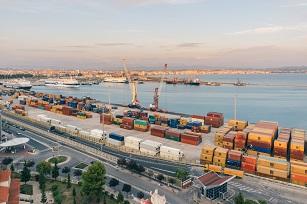
The European Union and the German Federal Ministry for Economic Cooperation and Development (BMZ) launched today, 28 July, with a virtual kick-off meeting, a new project "Support to Regional Economic Integration” in the Western Balkans and the Republic of Moldova.
Funded with a total budget of €5.35 million, the project aims to boost trade relations and further deepen economic integration between the Central European Free Trade Agreement (CEFTA) Parties. The three-year project, implemented by Deutsche Gesellschaft für Internationale Zusammenarbeit" (GIZ) GmbH, will help to further develop trade facilitation and trade in services under the CEFTA Agreement so they become operational for companies from the region.
In particular, through the improvement of trade procedures and regulations, the project aims to enhance efficiency of supply chains in the region and reduce costs for businesses. Faced with the COVID-19 crisis and its socio-economic impact, promoting activities that facilitate trade is ever more important.
"The project provides a valuable support to CEFTA to advance both the regional and European economic integration agenda. This project comes at a crucial moment to keep momentum and progress in joint efforts to facilitate trade in goods and services in the region", stated Emir Djikic, Director of CEFTA Secretariat.
"Regional economic integration has never been so relevant. Building a common regional market, based on EU rules, will be key to socio-economic recovery efforts. This is also a good way to put the region on the radar of global companies seeking new business opportunities. Trade facilitation is a key component to ensure a smooth flow of trade in goods and services both within the region and connecting other markets", emphasised Francisco Lopez-Menchero, European Commission (DG NEAR) Deputy Head of Unit.
The project takes an integrated approach to eliminating barriers to trade and reducing the associated trade costs through two specifically tailored project components, focusing on the facilitation of trade in goods and supporting the implementation of key priorities on trade in services, both with a strong business-driven approach.
Background
About the European Union:
The European Union is made up of 27 Member States who have decided to gradually link together their know-how, resources and destinies. Together, during a period of enlargement of 50 years, they have built a zone of stability, democracy and sustainable development whilst maintaining cultural diversity, tolerance and individual freedoms. The European Union is committed to sharing its achievements and its values with countries and peoples beyond its borders. For more information, please visit: https://europa.eu/european-union/.
About the Central European Free Trade Agreement (CEFTA):
The Central European Free Trade Agreement (CEFTA) is a regional trade agreement for the Western Balkans and the Republic of Moldova. The agreement came into force in 2007. Its main objectives are to boost trade in goods and services and facilitate investments in the region, by providing framework for eliminating barriers to trade. Over the last years, CEFTA has been able to remove most intra-regional tariff barriers for goods. With the adoption of CEFTA Additional Protocol 5 (AP5) on Trade Facilitation and CEFTA Additional Protocol 6 (AP6) on Trade in Services, the region has at its disposal instruments for a further deepening of regional economic integration and alignment with the EU acquis: https://cefta.int/.
About the Deutsche Gesellschaft für Internationale Zusammenarbeit (GIZ) GmbH
GIZ is a service provider in the field of international cooperation for sustainable development and international education work. GIZ has over 50 years of experience in a wide variety of areas, including economic development and employment promotion, energy and the environment, and peace and security. The diverse expertise of our federal enterprise is in demand around the globe – from the German Government, European Union institutions, the United Nations, the private sector, and governments of other countries. They work with businesses, civil society actors and research institutions, fostering successful interaction between development policy and other policy fields and areas of activity. Their main commissioning party is the German Federal Ministry for Economic Cooperation and Development (BMZ). https://www.giz.de/en/html/index.html
Details
- Publication date
- 28 July 2020
- Author
- Directorate-General for Neighbourhood and Enlargement Negotiations
